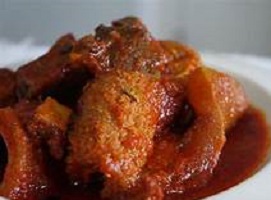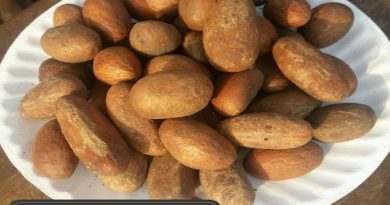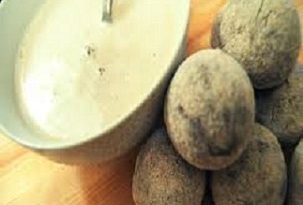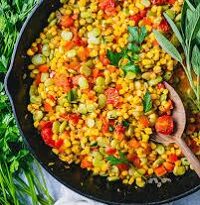Cow Skin Food: How Can Cow Skin (Ponmo) Be Used As Food?
Cow Skin Food: Questions on Cow Skin’s (Ponmo) Nutritional Value Answered.

In Nigerian slang, a cowskin is referred to as a “pomo” (sometimes spelled as Ponmo). I prefer the latter choice.
Table of Contents
About Cow Skin Food in Nigeria
It is mostly due to poverty in Nigeria and many other developing countries where the skin of cows and other animals such as sheep and goats is separated and sold separately. Due to the high cost of beef, more people are opting for cow skin recipes, which is much less expensive.
Please be aware that before being sold as Ponmo, the cow skin is subjected to some kind of treatments by the processors but that is not the subject of this conversation.
I’ll start with the nutritional value of ponmo (cow skin), on a lighter note, I’d like to share this with you: a BBC news story about cow skin and Nigeria sometimes in the year was titled “Nigeria eats its shoe leather”.
Yes, we consume so much ponmo that there is no longer any cow skin available for the leather industry. “Pomo eaters have chosen to walk on barefoot because they have decided to eat their own shoes in their pots,” Dr. Samuel Achi, the provost of Federal College of Chemical and Leather Technology, Zaria, said in the report.
Cow Skin Food: So, Is Cow Skin (Ponmo) Nutritious?
Cow skin is usually not consumed as food in most developed countries. As a result, there are little to no studies on the nutritional benefit of cow skin. Cow skins are transported in large quantities to the leather industry, where they are made into shoes, clothing, and other products.
Recommended >>> Cow Skin: Solid Truths About Eating Cow Skin (Pomo)
There isn’t a lot of detail about the nutrients in Ponmo. The only authoritative article you’ll find online is on PunchNG, in a news story about the Animal Science Association of Nigeria and the Nigeria Institute of Animal Science’s third joint anniversary, which was held at the University of Ibadan in 2014.
Dr. Akinwunmi Adesina, Minister of Agriculture and Rural Development, also spoke at the session, which was titled “Value addition in the Nigerian livestock industry: A plan for economic growth and stakeholder empowerment.”
According to an article on PunchNG and other websites, ponmo has the following nutritional benefits:
The nutritional analysis of a 40 gram piece of ponmo is:
Calories (150g); Total fat (4g); Saturated fat (1g); Poly saturated fat (0g); Mono saturated fat (0g); Trans fat (0g); Cholesterol (0g); Sodium (0mg); Potassium (0mg); Total carbohydrate (0g);
Dietary fibre (0g); Sugars (0 per cent); Proteins (0 per cent); Vitamin A (0 per cent); Vitamin C (0 per cent); Calcium (0 per cent); Iron (0 per cent).
You can see from this study that ponmo is deficient in all basic nutrients. However, I’ve seen advertisements in China from some food processors/manufacturers claiming to make nutritious kpomo or ponmo. They claim to have added vital nutrients to cow skin. I have no evidence to support their arguments.
Some people have also suggested that it may simply be a source of protein. Yes, collagen is a protein found in animal skin, muscle, and meat, but as we all know, there is something called Protein Quality. Since collagen lacks the amino acid tryptophan, it is not a complete protein.
While collagen and gelatin have many uses in medicine and the food industry (for example, producing gelatin), they are poor-quality sole sources of protein because they do not contain all of the necessary amino acids in the proportions that the human body requires—they are not “complete proteins.”
Cow skin
Cow skin, commonly known as beef tripe, is the edible lining of the stomach of cattle. While it may not be as popular as other cuts of meat, it is consumed in various cuisines around the world.
Here are some potential benefits of cow skin meat:
Rich in Protein:
Like other meat products, cow skin is a good source of high-quality protein. Protein is essential for building and repairing tissues, supporting immune function, and maintaining overall health.
Collagen Content:
Cow skin is rich in collagen, a structural protein that is crucial for maintaining the health of skin, joints, and connective tissues. Collagen is also known to promote skin elasticity and joint flexibility.
Nutrient Density:
Cow skin contains various nutrients, including vitamins and minerals such as iron, zinc, and B vitamins. These nutrients play important roles in various bodily functions, including energy metabolism, immune function, and blood formation.
Potential for Gelatin Production:
Cow skin can be processed to produce gelatin, a substance with various culinary uses. Gelatin is often used in desserts, soups, and various food products. It may also have some health benefits, such as supporting joint health and improving skin conditions.
Cultural and Culinary Diversity:
In many cultures, cow skin is used in traditional dishes, adding diversity to the culinary landscape. The preparation and consumption of tripe vary widely, and it is often included in stews, soups, or grilled dishes.
It’s important to note that while cow skin can offer nutritional benefits, it may not be suitable for everyone. Some people may find the taste, texture, or odor unappealing.
Additionally, individuals with certain dietary restrictions or health conditions may need to be cautious about consuming certain animal products.
As with any food, moderation is key, and it’s essential to consider individual preferences and dietary needs.
If you have specific dietary concerns or health conditions, it’s advisable to consult with a healthcare professional or a registered dietitian for personalized advice.
What nutritional benefits does cow skin meat offer?
Cow skin meat, also known as beef tripe, is rich in high-quality protein, essential for tissue repair and immune function. It contains collagen, promoting skin and joint health, and provides essential vitamins and minerals such as iron, zinc, and B vitamins.
How does the collagen in cow skin meat contribute to health?
Collagen is a structural protein found in cow skin meat that supports skin elasticity, joint flexibility, and connective tissue health. Consuming collagen may contribute to improved skin and joint health.
Are there any specific nutrients in cow skin meat that are noteworthy?
Yes, besides protein and collagen, cow skin meat contains essential nutrients like iron, which is important for blood formation, and zinc and B vitamins that play roles in various bodily functions, including metabolism and immune support.
Can cow skin meat be beneficial for those looking to boost their protein intake?
Absolutely. Cow skin meat is a good source of protein, making it a valuable addition to a diet aiming to meet protein needs. Protein is crucial for muscle maintenance, repair, and overall body function.
Are there culinary uses for cow skin meat?
Yes, cow skin meat is used in various traditional dishes around the world. It can be included in stews, soups, or grilled dishes, adding cultural diversity to culinary practices.
What precautions should individuals take when consuming cow skin meat?
While cow skin meat has nutritional benefits, individual preferences and dietary restrictions should be considered. Some people may find its taste or texture unappealing, and individuals with dietary restrictions or health conditions should consult healthcare professionals for personalized advice.
Can cow skin meat be processed into other products with health benefits?
Yes, cow skin can be processed to produce gelatin. Gelatin has culinary uses and may offer benefits such as supporting joint health and improving skin condition.
How should cow skin meat be included in a balanced diet?
Cow skin meat can be part of a balanced diet when consumed in moderation. It can be prepared in various ways, ensuring a diverse and nutrient-rich approach to overall nutrition.
Remember, individual dietary needs vary, and it’s advisable to consult with healthcare professionals or dietitians for personalized advice based on specific health conditions or concerns.
Read Also: Peppered Kpomo Recipe – Nigerian Cow Skin (Ponmo) Appetizer


